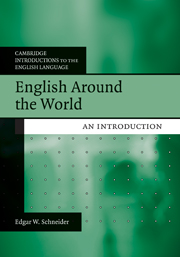Book contents
- Frontmatter
- Contents
- List of figures
- List of maps
- List of tables
- List of texts and audio samples
- Acknowledgments
- A note on using this book
- 1 Introduction
- 2 Basic notions
- 3 Historical background
- 4 Language crossing an ocean: Old World and New World
- 5 Settlers and locals: Southern Hemisphere Englishes, transported and newly born
- 6 Missionaries, merchants, and more: English is useful, English is ours
- 7 Language development: a general perspective
- 8 Issues and attitudes
- 9 Conclusion
- Appendix 1 Phonetic characters
- Appendix 2 A list of guiding questions on English in any specific region
- Glossary
- References
- Index
2 - Basic notions
- Frontmatter
- Contents
- List of figures
- List of maps
- List of tables
- List of texts and audio samples
- Acknowledgments
- A note on using this book
- 1 Introduction
- 2 Basic notions
- 3 Historical background
- 4 Language crossing an ocean: Old World and New World
- 5 Settlers and locals: Southern Hemisphere Englishes, transported and newly born
- 6 Missionaries, merchants, and more: English is useful, English is ours
- 7 Language development: a general perspective
- 8 Issues and attitudes
- 9 Conclusion
- Appendix 1 Phonetic characters
- Appendix 2 A list of guiding questions on English in any specific region
- Glossary
- References
- Index
Summary
In this chapter …
In this chapter we will have a closer look at a number of fundamental notions which will help us to understand how the varieties of English which have grown around the globe can be understood and conceptualized. This begins with challenging very deeply rooted ideas about the prevalence of “standard languages”: I argue that it is more appropriate to think of “varieties” of a language, or “dialects” (of which a standard language is just one type), as systematic, communicatively effective entities with characteristic properties on various levels of language organization (sounds, words, grammatical rules). It is equally important to understand that languages are neither stable nor secluded – they always change in the course of time, and especially in the modern world they are continuously getting in contact with and influencing each other (so that, for instance, words of one language are picked up and used in another).
As the product of migration, variability, and borrowing, different kinds of English have emerged in different locations around the world. We will get to know some suggestions on how to get order into this bewildering range of dialects, on how to categorize varieties of English into different types, partly on the basis of how they have originated and how they are employed in a given society. In fact, it will be shown that what happens to a language in the course of time is not exclusively a linguistic process but that the social setting of language use is absolutely decisive for the properties which a language variety has. The evolution of a language depends very strongly upon external factors, the fates of its speakers.
Information
- Type
- Chapter
- Information
- English Around the WorldAn Introduction, pp. 14 - 41Publisher: Cambridge University PressPrint publication year: 2010
